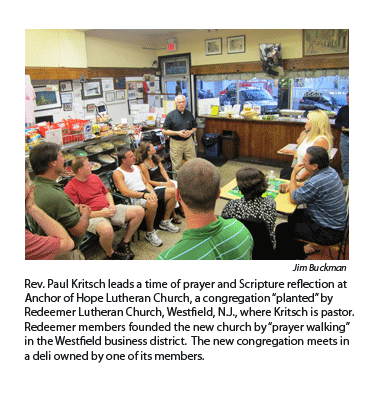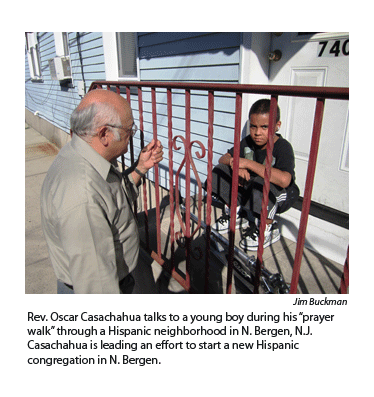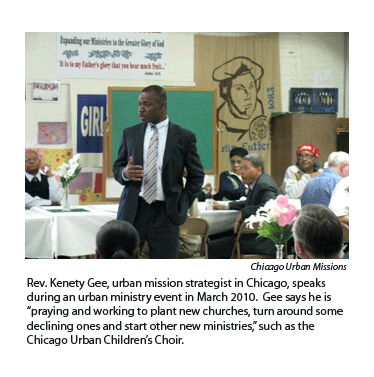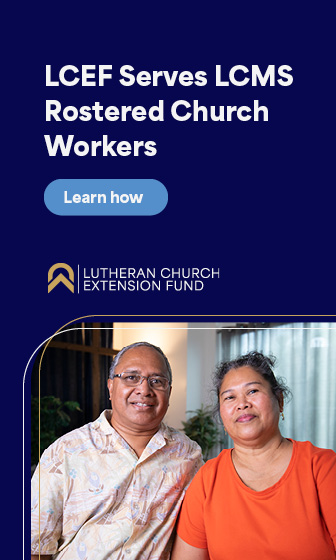By Paula Schlueter Ross
Rev. Yohannes Mengsteab believes he has found the world-mission pot of gold. It is in America’s cities, he says, which are rich with outreach opportunities like never before.
America “is becoming more diverse than ever,” he says, with more Hispanic, African, Asian, Central and South American, and European immigrants.
Moreover, the Hispanic birthrate in the U.S. has grown by more than 20 percent, while Anglo and African-American birthrat es have declined, according to Mengsteab, director of new mission development with LCMS World Mission.
es have declined, according to Mengsteab, director of new mission development with LCMS World Mission.
“The predominant ethnic presence is in the city,” he says. “And if we want to impact those [ethnic] communities, we cannot ignore our cities. We must work intentionally and vigorously to reach out to people who are not connected to any church home.”
In an effort to do just that, LCMS World Mission has identified 22 major metropolitan areas in which to launch “urban mission strategies.”
So far, a dozen “urban mission strategist” missionaries are in place — in Atlanta, Baltimore, Boston, Chicago, Cleveland, Dallas, Detroit, Houston, Kansas City, Minneapolis/St. Paul, New York and Newark, N.J.
Other cities that have been targeted for LCMS urban missionaries are Denver, Phoenix, Las Vegas, Miami, Orlando, Los Angeles, San Francisco, San Antonio, Seattle and Jacksonville/Fort Lauderdale, Fla.
“The goal is to have a strategy in all 22 major metropolitan areas,” says Mengsteab. The deadline? “Yesterday,” he laughs. “We are working toward it and, hopefully, it won’t be long.”
Rev. Landon Schkade Jr. has been serving since January 2009 as senior mission strategist among Liberians, Brazilians, Ethiopians and Hispanics in Boston. He is called, he says, to “witness [his] faith in Jesus Christ,” which includes identifying and training indigenous leaders, identifying opportunities to plant new congregations, and developing partnerships to assist in those endeavors.
Schkade says there are “numerous” ministry opportunities in Boston, where some 96 percent are “unchurched or dechurched,” with no church home.
“Among the unchurched are members of various ethnic and culture groups, including an estimated 130,000 Portuguese speakers, numerous Asian Indians, Africans, Chinese, Koreans and Hispanics,” he says, plus more than 200,000 American and international students attending 70-plus educational institutions — “the largest student population in a concentrated area in the world” — plus “a large population of young professionals.”
The “dechurched” include Irish and Italian Roman Catholics who “rarely attend services and are not involved in an active relationship with the Savior.”
It is, he says, “a target-rich area.”
Along with ministry among ethnic groups, reaching out to college students and other young adults in U.S. cities like Boston also is “very critical,” echoes Mengsteab, since “those between 18 and 30” — who are away at school or living on their own — “always have been the most difficult to reach” with the Gospel.
Urban ministry, he says, is “also about intentionally starting congregations that are going to reach our children, and their children, who are going to the city.”
With all of these mission opportunities — many of which are on the East and West Coasts and have fewer Lutherans than other parts of the country — the Synod’s response “has to be a churchwide effort,” according to Mengsteab. “And we need our [6,100] congregations to be involved.”
Any congregation — regardless of its size or location — can get involved by providing financial and other support to an LCMS urban missionary, he says.
Concordia Lutheran Church in Kirkwood, Mo., a St. Louis suburb, supports a half-dozen mission endeavors overseas and in the United States, including urban ministries in St. Louis, Kansas City and New Jersey.
In the latter, Concordia provides some $25,000 a year to the ministry of Rev. Jim Buckman, an LCMS urban mission strategist who works — in partner ship with local congregations — to plant “house churches” among Africans, Asians, Central and South Americans, and Russians throughout the Garden State. Seven such “houses of prayer” have been established since Buckman began that ministry about a year ago.
ship with local congregations — to plant “house churches” among Africans, Asians, Central and South Americans, and Russians throughout the Garden State. Seven such “houses of prayer” have been established since Buckman began that ministry about a year ago.
“Our [mission] dollars only go to where our hands and feet can also follow,” explains Rev. Monte Haun, Concordia’s executive pastor. So, every one of its mission partnerships must be willing to provide opportunities for Concordia members to serve as volunteers.
In fact, the congregation recently launched its ” ‘Go!’ — God” campaign — an effort to get 80 percent of its 1,600 regular worshipers to serve short-term or sustainable long-term mission projects by fall 2011.
” ‘Go!’ — God” is aimed at everyone — young and old — as a way of “getting the ball rolling” for volunteer mission service, says Haun.
The idea, according to Senior Pastor Scott Seidler, is to create enthusiasm — and more support — for mission by encouraging Concordia members to get personally involved.
“I want to stop talking about mission from the pulpit because, if I preach it, that may gain something,” Seidler says, “but if everybody in the pew is preaching it, then it’s a thousand times better.”
Supporting Buckman “is a good investment” and will have “a lasting effect,” Haun adds, because congregation members will get first-hand experience sharing their faith in a true “mission field,” and their service — and dollars — will enable Buckman’s ministry to “move forward” and reach more people with the Gospel.
Buckman agrees, and says “it’s a great thing” to link congregations with urban ministries because it provides “blessings throughout our church body.” He gets willing workers to lead vacation Bible school, medical ministries and “prayer walks,” and the sponsoring congregation gets mission experience. Buckman has even led outreach workshops at Concordia, sharing techniques, such as “prayer walking,” that can be used just about anywhere.
“Prayer walking,” he explained, is simply going door to door to ask residents if you can pray for them, praying with them if they are receptive to it, and then visiting them a week or so later to ask how they are.
It can be very effective as a first step in planting a congregation, he said, because “people want to know that God loves them and that there are people who love them,” especially in these economically challenging times.
“The cities are where most of the population of America is located, and the cities are where most of the future population of America is located,” Buckman said. It’s also where “you’re going to find concentrations, pockets, of the diffe rent people groups.
rent people groups.
“And so, once you connect with the key people in those people groups, you can really influence a community.”
Rev. Kenety Gee, urban mission strategist in Chicago, sees his ministry as working, with God, “to reverse the trend of urban church decline.”
Some 30 years ago, more than 35,000 people worshiped in Chicago-area LCMS churches on Sundays, according to Gee. “Today there are less than 5,000 people in our 50 listed congregations,” he says. “In the last several years we have closed more churches in the city than we have planted.”
The population of Chicago “continues to climb, while our churches are declining, baptizing fewer people, with [fewer] people coming to our worship services,” Gee says. “The harvest here is indeed plentiful.”
Mengsteab agrees, and says urban ministry goes far beyond the city, and even the country.
“These major metropolitan areas present a tremendous opportunity for us to make a difference in North America and beyond,” he says. “What we do in the city is not going to remain in the city — it impacts the nation” and “has a global impact because the people who come to the city are migrants, recent refugees and immigrants that are going back to their home countries.”
The people we reach today, in our urban centers, he says, “will be extremely significant in the mission movement of the 21st century. And the churches that are very connected to the cities and to these people groups will be churches that are going to be very influential around the world.”
Today’s urban challenge, he adds, “is a mission opportunity for us, and I’d like our church to be on the cutting edge.”
For more information about supporting an urban missionary — or getting connected to an urban mission field — contact Mengsteab toll-free at 800-433-3954, ext. 1336, or yohannes.mengsteab@lcms.org.
Posted Oct. 13, 2010




